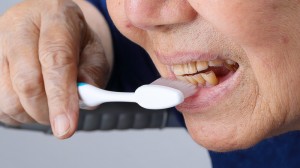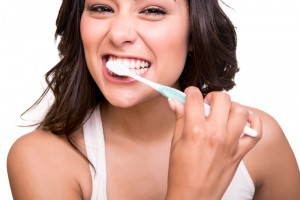Avoiding and Combatting Tooth Erosion
The teeth are made up of almost pure mineral content. However, they can break down just like any other type of tissue if they have the right substance working on them. If that substance is any form of acid, it will strip away minerals and erode your teeth. Tooth erosion can happen from the foods you eat and drink and various other factors that have to deal with your oral health. Find out why tooth erosion happens and how to protect your teeth from it so your smile stays bright and strong!
What Is Tooth Erosion?
Tooth erosion is essentially what the term would suggest: the erosion of your teeth. That means that your teeth are wearing away or becoming destroyed overtime, and it’s not something you want. Unfortunately, just about every person has tooth erosion in some form or another. Most patients don’t realize this is happening until they see that their smile has become more yellow or that they are getting more cavities than they used to. Tooth erosion often accompanies tooth decay.
Tooth decay is the decay of your teeth that happens as your tooth enamel erodes. Your teeth are almost pure mineral content, which means they are made up of minerals tightly packed together. Because your teeth are about 96% mineral content, that makes them the hardest substance in the body—even more than the bones. Every time you eat or drink, those substances are coming in contact with your tooth enamel, which is the hard outer layer of your teeth. Below that layer is the dentin, which is slightly softer with very tiny holes here and there that go to the center of your tooth. That center is the tooth pulp.
As tooth erosion happens to the layers of your teeth, decay can form. Keeping hard, outer enamel is key to keeping that hard layer intact. If not, harmful substances will slowly wear away that layer until you have gaps on the surface. Once that happens, bacteria and sugars get inside your tooth and decay the inner layers. When bacteria starts to decay the center of your tooth, it leads to large cavities and infection. However, tooth decay all starts with tooth erosion.

Foods to Watch For
You are what you eat, and that can even count for your teeth. The food you put into your body is the fuel that will help your body run smoothly or not. However, all of that food passes through your mouth, coming in contact with your teeth. What you want to watch out for is added sugars in foods. Your body doesn’t need added sugars, yet they are found in most foods. Some foods contain several days’ worth of recommended sugar in one item. Sugar will act as an acid on your teeth because it mixes with bacteria. That mixture creates plaque, which is acidic, causing tooth erosion. The less sugar you eat, the less tooth decay and tooth erosion you will have.
Foods that can damage your teeth include:
- Anything with high amounts of sugar, especially chewy treats like licorice, taffy, Tootsie Rolls, caramels, Starburst, Skittles, gummies, dried fruit and more.
- Hard candies/Mints: These expose your teeth to sugar over a long period of time, causing decay.
- Citrus Foods: Citrus fruits such as oranges, lemons and limes can be sour. That sour flavor comes from natural acids in the foods. Those acids can erode your teeth when you eat them.
Drinks Can Be Very Damaging
Oftentimes, what you are drinking is what is damaging your teeth the most. Many drinks have acids added to them to either preserve ingredients, the flavors, or to make carbonation possible. Those acids will strip minerals from your teeth on contact, and will then sit on the teeth for up to 30 minutes after drinking. All that time they work at breaking apart minerals that keep your teeth strong. Drinks you should avoid to prevent tooth erosion include:
- Juice/Citrus Drinks: Many juices will contain citric acid in them. That acid (and any acid) will take minerals from your teeth and will cause tooth erosion over time. Don’t brush your teeth for 30 minutes after drinking these or you could take off even more layers from your enamel.
- Soda/Carbonated Drinks: Carbonation is made possible by carbonic acid reacting with water. That creates a chemical reaction called carbonation, which is the fizzy bubbles in sodas. Because it’s acidic, carbonation will erode your teeth over time while also decaying them if there is sugar in the drink. Even sparkling water is acidic.
- Sports Drinks: Although not generally acidic, some flavors can be if they are citrus-based. Many sports drinks are also full of sugar, which is one of the worst substances for your teeth.
- Coffee and Tea. Both contain dyes that can stain your teeth. Some also contain acids in them.
- Alcohol: Many of these are very acidic and harmful to your body and your teeth. Avoid them to avoid tooth erosion.
Preventing and Combating Tooth Erosion
Prevention is always best when it comes to tooth erosion. Take note of the foods and drinks you consume. Cut out the ones that will hurt your teeth. If you do ingest them, make sure you practice really good oral hygiene. The better your oral hygiene, the less erosion from plaque you will get.
Adding fluoride into your oral hygiene routine can add a layer of protection to your teeth. This is a naturally-occurring mineral that helps seal your teeth, preventing tooth erosion and decay. It’s found in toothpastes, gels and public water sources. You will get a fluoride treatment at your dental cleanings, which should be done every 6 months. We can spot the signs of tooth erosion at these appointments. For more tips to avoid tooth erosion and restorative dentistry services to improve your smile, call Dr. Evanson’s office today at (720) 409-0008!
Leave a reply →








